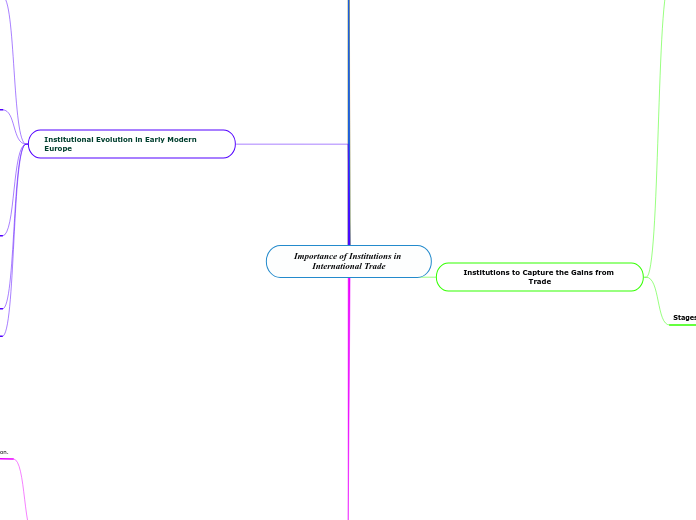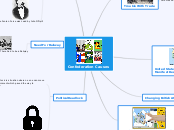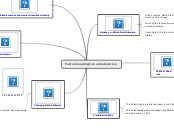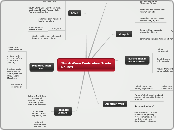The institutional matrix is an interdependent network of institutions, political and economic organizations that are responsible for
for returns.
Thanks to all this, efficient methods were developed to finance long distance trade, capital markets and discount methods in finance houses that reduced the costs of subscribing to the market. It also led to the development of techniques to distribute risk and
Transform uncertainty into actuarial and verifiable risks.
economic activity
Importance of Institutions in International Trade
Contrasting Stories of Stability and Change
trader would invest
improved knowledge and skills
having greater bargain skills than other traders
getting better information on opportunities
political competition for more income and survival
the basic institutional framework creates opportunities for subsequent organizations to evolve,
promote activities that improve productivity
economic change due to the increasing returns
institutional change
organizational structure
the basic institutional framework
improving knowledge and skills meant getting better information about opportunities, having more negotiation and more wealth
changes in the human economic condition.
private gains
changes
institutional
raises productivity
organizational
maximizing activity
no greater productivity
Institutional Evolution in Early Modern Europe
distributed risk
union for more information
printing of prices of various commodities, manuals that provided information on weights, measures, customs, brokerage fees, postal systems, and the complex exchange rates between monies in Europe and the trading world.
uncertainty into risk.
Relating economies of scale and the development of improved mechanisms to enforce contracts at lower costs
insurance and portfolio diversification are
methods for converting uncertainty into risks
Opening to a large number of investors to participate in risky activities
Jewish origins
practice to use printed forms provided with a few blank spaces for the name of the ship, the name of the master, the amount of the insurance, the premium, and a few other items
coverage against variability, security and transaction costs
Innovation and techniques
development of internal codes of conduct in fraternal orders of guild merchants
enforcement mechanisms by traders themselves
commercial law
development of discounting methods
improved enforceability of contracts
innovations that enhanced the mobility of capital were the
techniques and methods evolved to evade usury law
evolution of the bill of exchange
Complex organizatition
mobility of capital
institutional development
Increasing volume
the writing of contracts to disguise interests complex and cumbersom
became more problematic
When Institutions Do Not Evolve
While tribal chieftains found it profitable to protect merchant caravans they had neither the military muscle nor the political structure to extend, develop, and enforce more permanent property rights.
Long-Distance caravan trade
Protection is personal, unqualified, explicit, and conceived of as the dressing of one man in the reputation of another
The reputation may be political, moral,
spiritual, or even idiosyncratic, or, often enough, all four at once.
Does not have an effective legal structure and court system to enforce contracts
Berber societies
Regional Economy
finely drawn division of labor
low fixed costs in terms of rent and machinery
Systems of weights and measures areintricate and incompletely standardized.
Missing fundamentals underpinnings of institutions that would make organizations viable and profitable
an enormous number of small transactions
Tribal Society
innovation would be seen to threaten survival
high costs of transacting
Delicate balance of power
Institutions to Capture the Gains from Trade
Stages of exchange
modern western societies
the markets
become
world
National
specialization has increased
society is overwhelmingly urban
The technology associated with the growth of manufacturing
secure property rights
judicial system
allow
flexible laws
low costs contracting
polity
entailes
increased fixed capital
a developed transport network
a disciplined labor force
uninterrupted production
equipment
plants
A capital market
security of property rights
rulers
Economies of scale
get start
hierarchical producing organizations
central places
full-time workers
increases
In the proportion of the labor force engaged in manufacturing and services
URBANIZATION OF THE SOCIETY
Long distance trade
Problems
Transaction costs
CONTRACT NEGOTIATION AND ENFORCEMENT
foreign countries
standardized weights and measures
protection of the goods and services en route
enforce contracts
PROBLEM OF AGENCY
use of kin
measur
The price of "defection"
Performance
The strength of kinship ties
Specialized producers
Geographic specialization and occupational
Substantial specialization
permanent towns or cities
fairs
Local exchange
hunting and gathering societies
Small scale trade
informal constraints
costs of transacting low
Specialization
self-sufficiency
rudimentary
The earliest economies
local exchange
trade expands
longer distances
shipping routes
boats
caravans
bazaar-like economy
region
Definition
Restrictions
Informal
Code of conduct
Traditions
Taboos
Formal Rules
Laws
Constitutions
Structure the interaction
Social
Political
Economic
determines the choice set
production costs
Transactions
What makes it necessary to constrain human interaction with institutions?
Institutions and the effectiveness of enforcement
raises the benefits
solutions to problems of organization
competitive framework
the costs of defection
cooperative solutions
determines
The cost of transacting
Efficient and competitive markets
Evolution of political and economic institutions
Property rights
create
economic environment
increase productivity
The formal economic constraints









